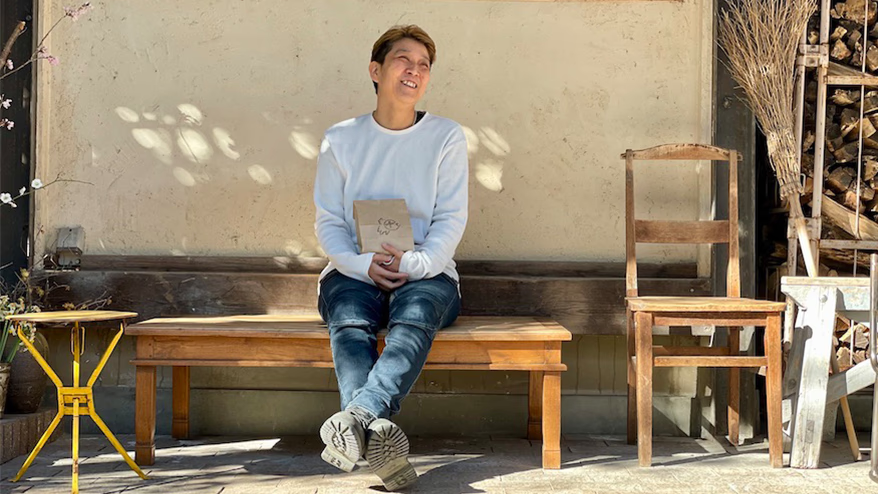こんにちは。ものさすサイトの裏方でお手伝いをしている、京都在住のライター・杉本です。
モノサスがフルフレックス制度を導入してから満3年、そしてフルリモートになってもうすぐ1年になります。働く時間と場所を自分たちで決められるようになった今、モノサスのメンバーはどんなふうに、自律したワークスタイルをつくっているのでしょう。そして、個として働く時間が多くなるなか「会社」という場、あるいは組織に対する意識はどう変化しているのでしょうか?
「自由と責任 みんなの制度と働き方実験室」は、社員のみなさんに今の働き方をざっくばらんに話してもらうインタビュー連載。今回は、WebディレクターとしてWebの運用代行のお仕事をしている児嶋いずみさんにお話を伺いました。
フルフレックスで働くという文化を醸成する
杉本:2017年1月に、フルフレックス制度が導入された当時、児嶋さんはどういう働き方をしていましたか?
児嶋:コーディングファクトリー部(以下、CF)のマネージャーをしていました。フルフレックスになった直後は、部内にいろんな不具合が出たのでその調整に時間がかかりました。
CFのメンバーは、今まで通りの時間に働く人、朝型の人、夜型の人という3タイプにきっちり分かれたんです。すると、出社する時間帯が変わったことで社外との連絡がとりづらくなったケースがありました。「好きな時間に働いていい」ということになっているので、どこまで介入していいのか難しかったです。フルフレックスを続けるなかで会社を辞めて、今は外注として関わっているメンバーもいますね。
杉本:自由って、自分ひとりで成立しないという難しさがあるなあと思います。一緒に仕事をする周囲とのすり合わせは必要でしょうね。
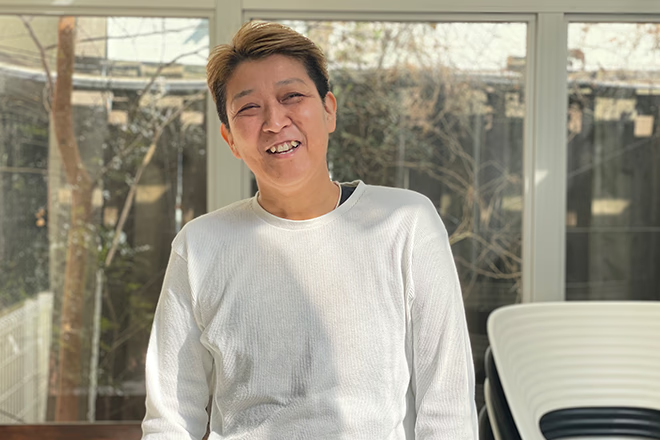
みんなの姐御的存在・児嶋さん。あかるいハスキーヴォイスが聞こえると元気になります。
児嶋:そうですね。みんながやりたいようにやっちゃうとうまくいかない。フルフレックスを導入するときに、林さん(モノサスの代表)が全体の枠組みについては十分説明されたのですが、やっぱり制度は具体的になればなるほど不具合が起きるので。
なんだかんだ言いながら、それぞれの働く時間が決まっていって、それぞれの癖を周りの人が覚えていって、多少のアラはあるけれどなんとなくルーチン化していきました。
杉本:自分が働く時間を変えたら、社内のメンバーやお客さんにも影響がある。だから「こうするけどいいかな?」とみんなで話し合わないと、フルフレックスが機能しないということでしょうか。
児嶋:各自がお客さんや一緒に働くメンバーに対してちゃんと合意をとらないといけないし、その認識が弱いなと思えばマネージャーは何かしらのアプローチをかけないといけない。願わくばメンバー同士の横のつながりでも話し合って、それぞれが主体性をもって新しい文化を醸成していかなきゃいけなかったんだと思うけど、そのプロセスがなかなか大変でした。
仕事と趣味の両立はしやすくなりました
杉本:児嶋さん個人としては、フルフレックスになって仕事とプライベートの時間の使い方のバランスに変化はありましたか?
児嶋:いや、あんまりないですね。私は仕事オタクでヅカおたく(注:宝塚歌劇の大ファン)なので、仕事をしているか観劇をしているかなんです。そんな二択しかないの?って感じだけど。
杉本:ヅカおたくはわかりますけど、仕事オタクって!仕事が好きでオタクってことですか?
児嶋:なんか、モノをつくるのが好きなんですよ。それぞれの人がいいところを持ち寄って、つくりたかったものがかたちになっていくプロセスがすごく好きで。そういう仕事に関われていると、自分がもっているものは「これもあるぜ、あれもあるぜ?」って全部出したくなっちゃう感じです。
杉本:なるほど。ヅカに関しては、フルフレックスになると観劇に行きやすくなったのでは。
児嶋:あー。ご観劇は18時半とかに始まるから、17時半に普通に会社を出られるようにはなりましたね。あと、推しの人の公演って1ヶ月半くらいの期間に固まっているから、チケットが取れたら取れるだけ見に行きたいんですよ。そういうときは「この時期はマジでろくでなしになるけど、みんなほんとにごめんね」って早めに言っておくと調整して、快く「行ってらっしゃい!」って送り出してくれますね。
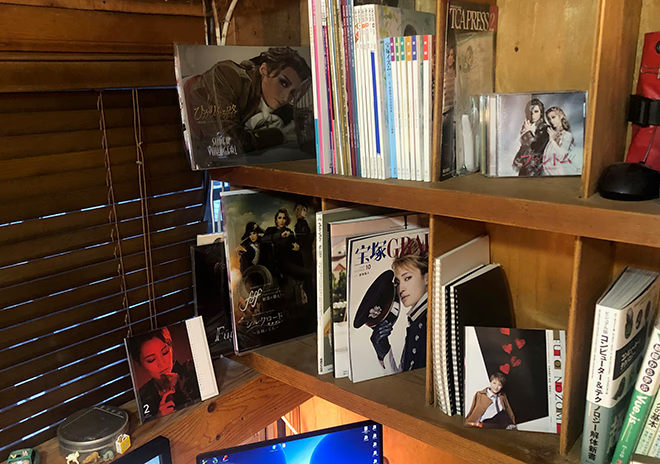
児嶋さんのデスク周りにあるヅカ関係のコレクション。
杉本:いいメンバーですね!基本的な出社時間は、変わらなかったんですか。
児嶋:傾向としては、パツって(忙しくなって)くればくるほど出社時間が早くなります。当時は特に、社内のこともお客さんのこともやらないといけないし。ボーボーしていたら(部内のメンバーがトラブルを抱えて”炎上”していたら)、とんとん(フォロー)しないといけなかったし。社外からの電話が鳴り始める時間から夜8時頃までは、わーっとミーティングが入っているから、制作したり考えたり、書類をつくったりするのは電話の鳴らない朝しかできないんですね。忙しいときには、始発で出社していたこともありました。
杉本:朝5時に出社するのって大変じゃありませんか?
児嶋:意外と平気なんですよ。ヅカがあってお酒が飲めれば(笑)。あと、CF部にいたときはけっこうみんなで飲みに行ってたんです。メンバーとのコミュニケーションをする場でもあったので、夜はそんな時間に半分はあてられていたから、やっぱり朝しかなかったんですよね。
フルリモートで働く環境を会社と自宅につくる
杉本:2020年4月から、CF部のマネージャーを外れてWeb運用チームに関わるようになったそうですね。それと同時に、新型コロナウイルスの感染拡大によるフルリモートがはじまって。
児嶋:はい。私も坂本さんと同じで、フルフレックス以上にフルリモートのほうが影響が大きかったです。
まず、私が担当しているお客さんの案件はセキュリティ管理が厳しくアクセス制限もあるので、基本的にオフィスじゃないと仕事できないので出社しないといけなくて。一緒に働くメンバーとシフトを組んだり、VPN接続をしたりする準備が必要でした。
やっぱりフルリモートで仕事をするようになると、今までは隣にいるメンバーと「これどうしよう?」と言いながら仕事していたのが、完全に画面越しだとそうはいかないので、朝礼の時間を設けるとか、スムーズに進めるための運用の体制もつくる必要がありました。
杉本:自宅で仕事することについてはすぐに慣れましたか?
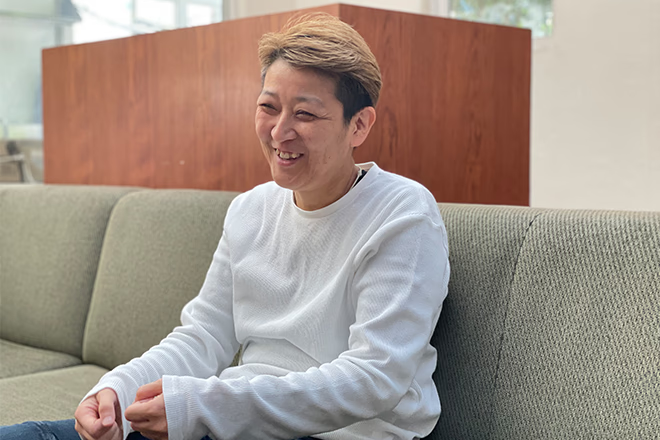
児嶋:私は、全然家で仕事できなくて。それが一番大変だったかな。結局、歩いて来れるし、会社で仕事していました。だから、他の人とのコミュニケーション以外は、自分の生活はあまり変わらなかったです。
杉本:もともと長くフリーランスで仕事をされていたし、自宅で働くのは慣れているのかなと思っていました。
児嶋:フリーランスだった頃は、カーペット2.5畳分をきっちり敷いて、机と棚を置いて集中が途切れない要塞みたいにしていたんです。そこに行けば仕事モードになれるようにきちんとできていたからよかったんですけど、今は部屋全体が私のリラックススペース。もうね、サンクチュアリーですよ、全部が。自分の中での決めごとって大事なんだなと思います。
ちなみに、住んでいた会社の寮内で部屋を引っ越して、スピーカーを買って音楽を聴けるようにしたら作業ができるようになったんです。そこまで影響があるとは思っていなかったんですけど、面白いなあと思います。
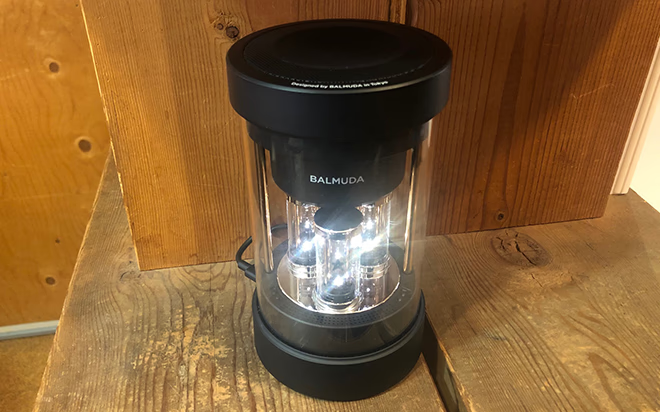
児嶋さんが購入したスピーカーはこちら。仕事が捗るなら私も買おうかな(そういう話ではないですね)
フリーランスでも暮らせるけどモノサスで働きたい
杉本:会社って、オフィスの空間とそこに人が集まることに大きな意味があったと思うんです。フルリモートになったら「これだとフリーランスと一緒やん?」と思いませんでしたか?
児嶋:「会社やめてフリーランスになってもいいんじゃない?」っていうのはあんまりないですねぇ。この会社にくる前に思ったのは、「フリーランスのままでいると、自分がもっているスキルが誰にも渡らずになくなってしまうのはもったいなくね?」ってことだったんです。自分だけブリブリがんばってもしょうがないし、誰かに伝えるのもありなんじゃないかなって。
あと、人と関わりながらチームで仕事をしたいと思って会社に来たから、今からまた個人に戻るのは考えにくいです。フリーのときは本当にひたすら制作をしていて、クライアント会社のディレクターさんくらいしか話す人がいなかったから。
会社だと、行くだけで何かしらの情報が入ってくる。自分だけではリーチできない情報が落ちていて、それが「こんなこともできるんだ」という次の刺激にもなるし、「こんな人がいるんだ」というインプットもされる。毎日会社に行けば誰かしらに会える、そういう交流って目には見えづらいけど心理的にやっぱりほっとする。ありがたいなとすごく思っています。
杉本:フリーランスとして、いろんなクライアントさんとお仕事をされていて、きっと他社からも「うちに来ませんか?」って引き合いがあったと思うのですが、なぜモノサスだったんですか?
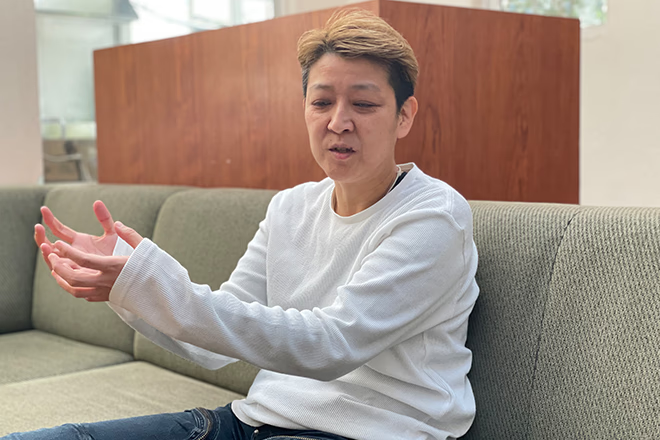
児嶋:すごい遡ると、「会社向きの人間じゃないな」と思ってフリーランスになったんです。最初に入った会社はすごく大きいところだったから「足並みをそろえなさい」っていう強度がすごくていづらかったんですね。
杉本:それ、めっちゃわかります(笑)。
児嶋:会社じゃない働き方というので個人で仕事をするようになったのだけど。モノサスとは2012年にたまたまご縁があって、1年間一緒にお仕事をさせていただいたんですね。なんかモノサスって変な会社じゃないですか。私みたいな人でも特に何の問題もなくコミュニケーションがとれる感じだし、「ここなら会社員として所属できるかも?」ってちょっと思った。
ちょうどそのときに、宮川さんがモノサス・タイランドを立ち上げることになって。国内のディレクター募集があったので、外注としてディレクターで入らせてもらったんです。半年くらい経ってから「もうちょっとこの会社の人たちと関わりたいな」と思って入社しました。
杉本:たしかに、モノサスはいわゆる“会社っぽさ”があまりない。個人が変わっていく結果として会社も変わっていくことを恐れないというか、むしろそこに挑むようなところがあって。
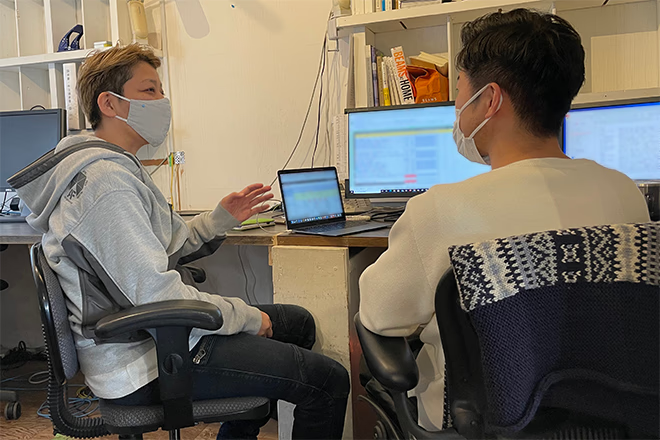
児嶋:やっぱりなんか、モノサスにはコミュニケーションをとりながら模索して行くところがなんかある。トップダウンでもないし、微妙な塩梅で有機的に変わっていく。その過程で人が辞めたりしたこともあるんですけど、結局はこの感じが好きな人が残って会社をつくっているというか。規模感的にも人のキャラクターとしても、今がちょうどいいのかなという感じがありますね。
モノサスの仕事をつくるメンバーの生態系
杉本:そんなモノサスの人たちにとって、この1年間のフルリモートへの移行はすごく大きな変化だったと思います。会社全体としては新しい働き方に慣れてきているのでしょうか。
児嶋:モノサスの場合は、モノサス・タイランドや周防大島や神山のサテライトオフィスとのやりとりで、リモートに少し慣れていたという状態がまずあって。フルフレックスの導入で試行錯誤しながら働く時間のことを自分で考える3年間があったうえで、今回のフルリモートというステップがうまい具合にあったのがよかったんじゃないかと思います。だから、なんとなくみんながついてこれて今のかたちがつくれたんじゃないかな。
杉本:なるほど。最後に、一緒に働くメンバーのみなさんについて聞いてみたいのですが、児嶋さんのように「自分がもっているものを掛け合わせて、人と一緒に面白いものをつくるのが好き」な人が多いと思いますか?
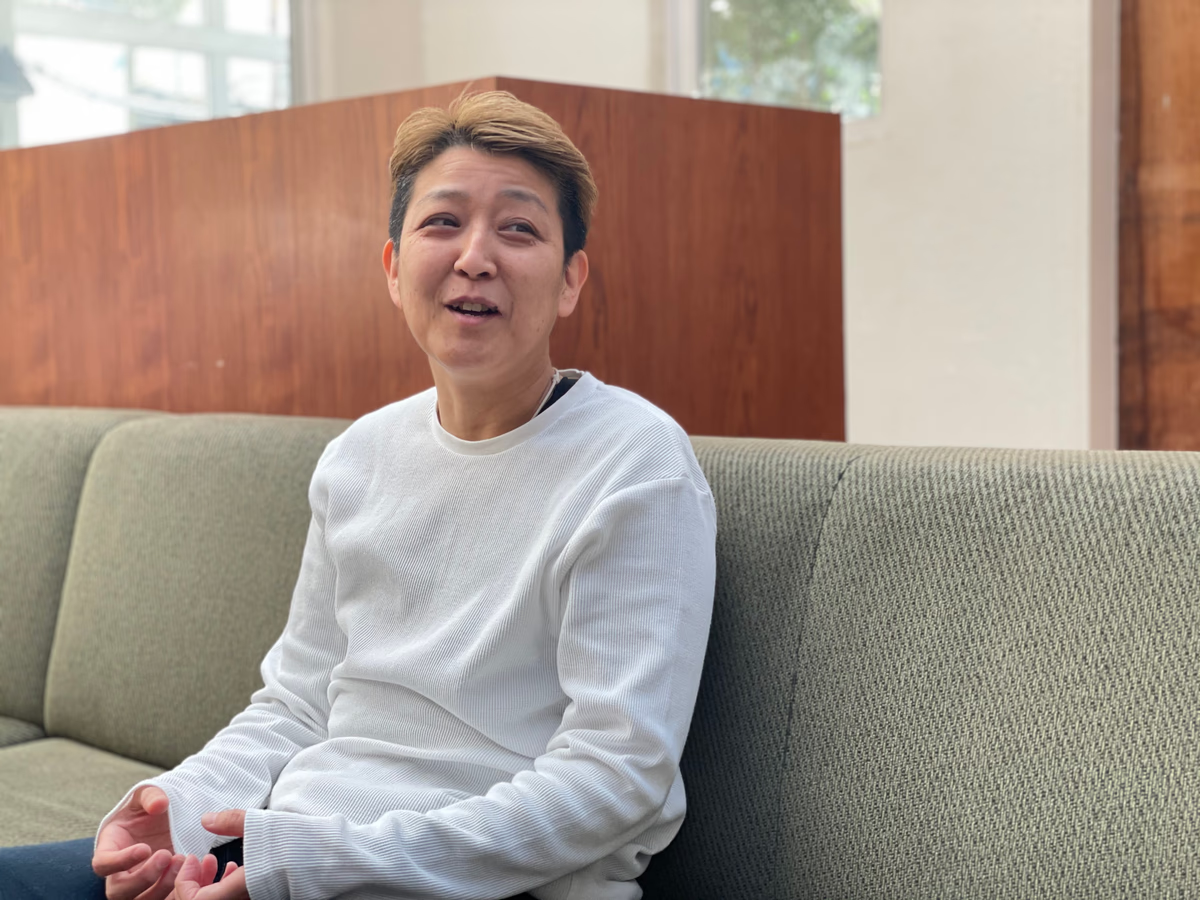
児嶋:そういうのが好きな人とそうでもない人に分かれている気がする。「俺は海賊王になるんだ。以上、あとはよろしく!」みたいな人もいるし、自分のやりたいことをゴリゴリ前に進めるのが得意な人もいる。一方で、旗を振る人をサポートするのが好きな人もいて、その中間層みたいな人があまりいない気がします。
そうだなぁ。0を1にする、1を10、10を100にするというのは、それぞれの得意分野みたいなものだと思っていて。会社としては、0から1、1から10をやる人ばかりを集めるとたぶんうまくいかなくて、10から100へとちゃんと見えるものに落としていく人たちもすごく重要だと思うんです。
杉本:モノサスとしてものをつくっていく生態系のバランスを保つ、みたいな感じですね。
児嶋:昨年、ビジネスオーナー制度を導入したことで、0から1、1から10にするのが得意な人たちのほうに意識が向いているんですけど、10から100にする人たちの勢力が強くないと、具体的にしくみをつくるところまで至らないので。私としては10から100が得意な人を大事にしたい気持ちはありますね。
ちゃきちゃきとした語り口がいかにも姐御肌!児嶋さん。「フルフレックスにしたときには3つのタイプに分かれた」「フルリモートがうまくいったのは3ステップあったから」などと、ものごとを構造的に捉える視点が印象的でした。同時に、「ボーボー」「とんとん」など擬音語が多い語りはすごくエモーショナルで、ロジカルな分析にもぬくもりがあって。いつか、児嶋さんの視点から語るヅカ(宝塚歌劇)の話も聞いてみたいけど、きっとヤケドするほど熱いんだろうなぁ。
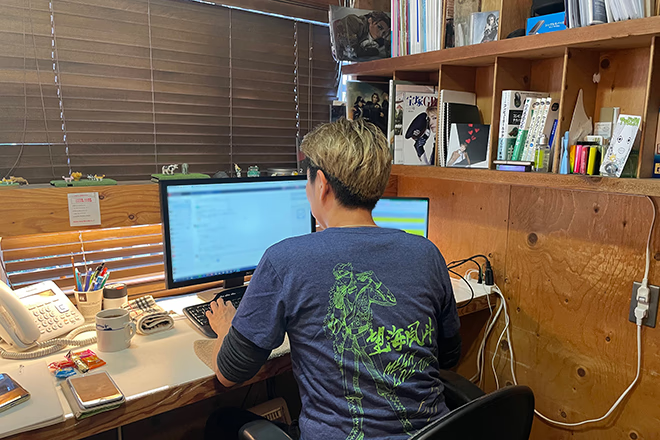
ヅカTシャツを着て仕事にはげむ児嶋さん。背中がかっこいいです!
